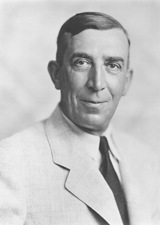George A. Wilson
| George Allison Wilson | |
|---|---|
 |
|
|
United States Senator from Iowa |
|
|
In office January 14, 1943 – January 3, 1949 |
|
| Preceded by | Clyde L. Herring |
| Succeeded by | Guy Gillette |
| 27th Governor of Iowa | |
|
In office January 12, 1939 – January 14, 1943 |
|
| Lieutenant | Bourke B. Hickenlooper |
| Preceded by | Nelson G. Kraschel |
| Succeeded by | Bourke B. Hickenlooper |
| Member of the Iowa Senate | |
|
In office 1925–1935 |
|
| Personal details | |
| Born |
April 1, 1884 Menlo, Iowa |
| Died | September 8, 1953 (aged 69) Des Moines, Iowa |
| Political party | Republican |
George Allison Wilson (April 1, 1884 – September 8, 1953) was a United States Senator and 28th Governor of Iowa.
Born on a farm near Menlo, Iowa, Wilson attended rural schools, and Grinnell College in Grinnell, Iowa. He graduated from the University of Iowa College of Law at Iowa City in 1907, and was admitted to the bar the same year. He then commenced practice in Des Moines. He was assistant county attorney of Polk County, Iowa from 1912 to 1914 and the Polk County Attorney from 1915 to 1916. He was a district judge from 1917 to 1921 and was a member of the Iowa Senate from 1925 to 1935.
In 1936, Iowa's Governor, Democrat Clyde Herring, ran for the U.S. Senate instead of running for re-election. Wilson won the Republican nomination to succeed him as governor, but was defeated by Democrat Nelson G. Kraschel in the general election by fewer than 3,000 votes out of over one million cast.
In 1938, Wilson again ran against Kraschel, with the opposite result. Wilson received 52.7 percent of the vote. Wilson was then re-elected as Governor in 1940, winning again by 52.7 percent in the general election over Democrat John Valentine after overcoming a surprisingly strong challenge in the Republican primary from future Congressman H.R. Gross.
Instead of running for a third term in 1942, Wilson decided to challenge Senator Clyde L. Herring, and defeated him. He served in the Senate from January 14, 1943, to January 3, 1949. His Senate committees included the Committee on Small Business and the Armed Services Committee.
In 1948, former U.S. Senator Guy M. Gillette, unseated in his own bid for re-election in 1944, ran against Wilson in the general election. Wilson was expected to win. However, in a year in which President Harry S. Truman and many other Democrats surprised pundits, Gillette defeated Wilson by over 150,000 votes.
...
Wikipedia
